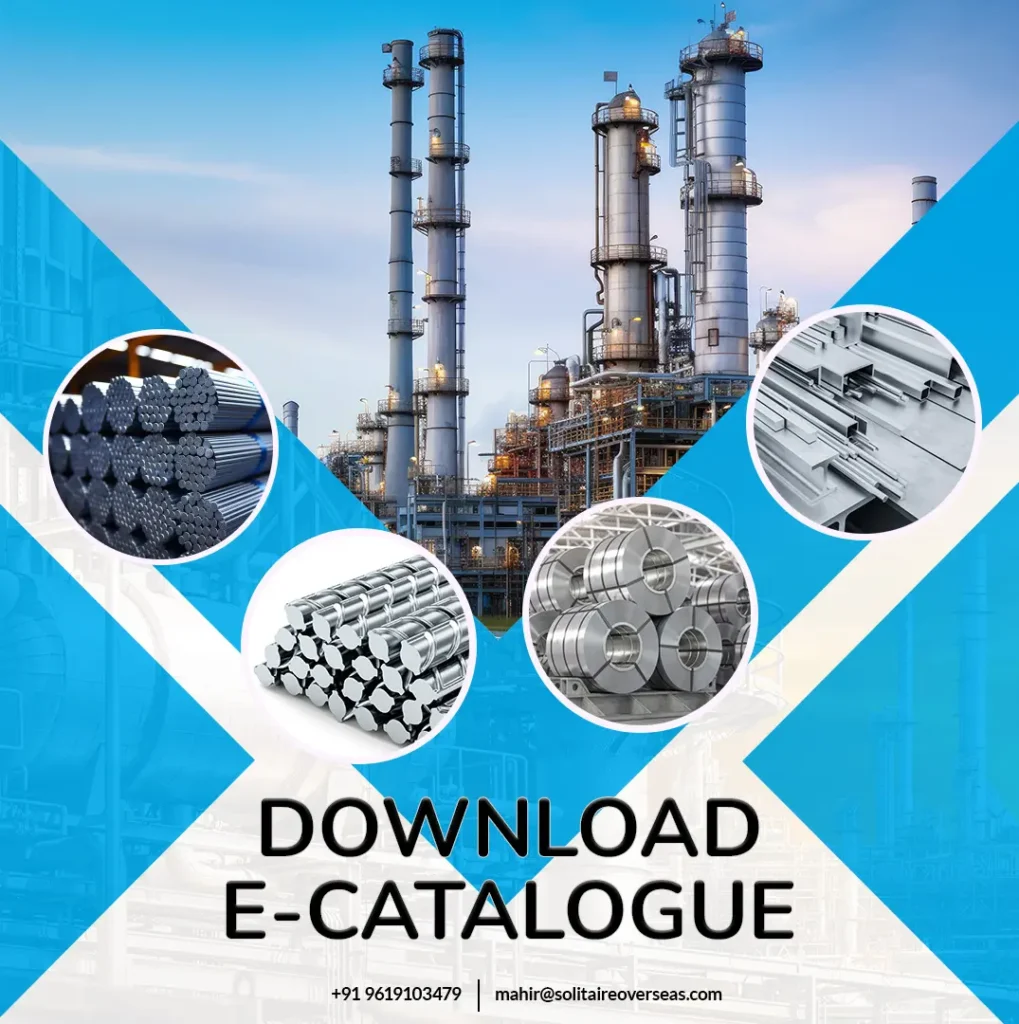Alloy Steel Grades & Specifications

What is Alloy Steel?
Alloy steel is a type of steel known for its adaptability and enhanced properties, making it suitable for a wide range of industrial applications. It is created by combining carbon steel with one or more alloying elements, such as manganese, silicon, nickel, chromium, titanium, copper, or aluminum. These additional metals give the steel specific qualities not found in standard carbon steel.
The alloy steel material can be customized to achieve properties like greater hardness, improved corrosion resistance, higher strength, better ductility (formability), and enhanced weldability. The specific alloy steel grades are determined by the type and amount of elements added, allowing manufacturers to create materials suited for particular uses.
Alloy steel is widely used in industries like oil and gas, aerospace, and defense due to its ability to perform reliably under high pressure and extreme conditions. From constructing pipelines to manufacturing heavy machinery and aerospace components, this material plays a critical role in demanding environments.
Understanding what alloy steel is, its composition, and its various grades ensures the right material is selected for specific applications, enhancing safety, durability, and performance.
Top Alloy Steel Grades for Industrial Use
Alloy steel grades are classifications used to distinguish different types of alloy steels based on their composition and properties. Each grade is customized to meet specific industrial needs, making it easier to select the right alloy steel material for a particular application. Below are some of the most commonly used alloy steel grades and their features:
- Alloy Steel 300M:
A high-strength steel created through a special vacuum process. It offers exceptional toughness, fatigue resistance (ability to endure repeated stress), and flexibility, making it ideal for aerospace components. - Alloy Steel 4130:
This grade is valued for its strength, toughness, and excellent weldability. It is widely used in manufacturing car and airplane parts. - Alloy Steel 4140:
Known for its strength and easy machinability, 4140 is perfect for making gears, shafts, and other components that need to withstand heavy loads. - Alloy Steel 4340:
This grade combines high strength, toughness, and wear resistance. It is often used in heavy-duty parts like crankshafts and aircraft landing gear. - Alloy Steel 6150:
Enhanced with chromium and vanadium, this steel offers excellent toughness and wear resistance, making it suitable for springs and high-strength applications. - Alloy Steel 8620:
Known for its ability to be hardened, 8620 is commonly used in gears and crankshafts, offering a tough and durable surface while maintaining a flexible core.
Each alloy steel grade serves a unique purpose, ensuring that industries can rely on the right material for their needs. Whether it’s for high-strength aerospace parts, durable gears, or resilient machine components, alloy steel remains a dependable and versatile choice.
Write to us
Key Changes in Alloy Steel for Enhanced Performance
Alloy steel is designed to meet specific industrial needs by altering its composition to improve its properties. Some of the most important and desirable changes in alloy steel material include:
- Increased Hardenability
Adding elements like manganese, nickel, and chromium improves the steel’s hardenability. This means it can be made harder and stronger through heat treatment, making it ideal for manufacturing heavy machinery, equipment, and tools. Hardenability is also essential for applications like oil and gas drilling equipment, where the steel must endure high stress and wear over time.
- Improved Corrosion Resistance
Elements like copper, silicon, and aluminum enhance alloy steel’s resistance to corrosion. These additions form a protective layer that shields the material from rust and chemical damage. This property is critical for applications in harsh environments, such as offshore oil rigs, chemical plants, and marine equipment, where exposure to moisture and chemicals is common.
- High-Pressure Strength
Alloy steel can maintain its hardness and strength even under extreme pressure. This makes it indispensable for applications where reliability is critical, such as in high-pressure pipelines, aerospace components, and heavy-duty machinery. Its ability to withstand high stress ensures long-term performance without failure in demanding environments.
These enhanced properties make alloy steel grades suitable for various industries, from energy and construction to marine and aerospace, ensuring durability, reliability, and superior performance.
Alloy Steel Grades & Specifications
| Chrome Molybdenum Steel | |
| Overview | We supply chromium molybdenum steel, chromium molybdenum nickel steel and chromium molybdenum tungsten steel to various engineering, power generation, oil & gas, petrochemical, welded tube fitting and nuclear industries. Our facilities enable us to cater to the specific requirement of the customers. |
| Application | Boiler Pressure Vessels, Tube & Pipe fittings, refinery equipments for elevated temperature service. |
| Grades | ASTM A387 Grade 11/ 12/ 22/ 5/ 9/ 91, EN 10028 -2 / DIN 17175 , ASTM A204 / A302, SAE 4130 / 4140 / 8620, EN 19 / EN 24 / EN 36 |
| Supply Condition | Normalized & Tempered / Annealed / Normalized. |
| Abrasion / Wear Resistant Steel | |
| Overview | The hardened boron steel is extremely resistant to abrasive wear and high surface pressure. The excellent mechanical properties of boron steels are achieved through heat treatment. It also offers good weldability with cold bending properties. |
| Application | Wherever demands are imposed on abrasion resistance e.g. dump trucks, excavators, loaders, chutes, conveyors, feeders etc. |
| Grades | 500HB / 400HB / 300HB / 200HB |
| Supply Condition | Quenched & Tempered(If required) |
| Quenched and Tempered Steel | |
| Overview | Quenched and tempered fine grained steel is used for welded steel structures having demands of low weight and high load. |
| Application | Pressure vessels, penstocks, bridges, transport vehicles, cranes, frameworks, conveying plants etc. |
| Grades | EN 10025-6-S500 / S550 / S620 / S690 |
| Supply Condition | Quenched and Tempered |
| High Tensile Steel | |
| Overview | The structural steel with high tensile properties is used for general construction so as to reduce the section weight. |
| Application | Fabrication, Engineering construction |
| Grades | EN 10025-2-S355 / S420 / S460. IS 2062 E350/ E410 / E450 |
| Supply Condition | Normalised / Normalised Rolled |
| Corrosion Resistant Steel | |
| Overview | It exhibits increased resistance to atmospheric corrosion compared to unalloyed steel as it forms and regenerates a protective layer under the influence of the weather. |
| Application | Steel frame structures, bridges, tanks, containers, exhaust systems etc. |
| Grades | ASTM A588 / A242. IRSM – 41 |
| Supply Condition | Normalised Rolled / Normalised |
| Tool Steel | |
| Overview | Hot & Cold work tool steels as per the Standard (A681) as well as customer requirement is produced based on design application, service condition and desired properties. |
| Application | Tools, Dies & Fixtures |
| Grades | A2 / H11 / O1 / D2 / D3/ S-13 / HCHCR |
| Supply Condition | Spherodise Annealed |
| Pressure Vessel Steels | |
| Overview | This Carbon steel plates are intended for welded pressure vessels, iron sturctures where improve notch toughness is important. |
| Application | Pressure Vessel Boiler, Tube Fittings |
| Grades | ASTM A516 / A515. ASTM A537 CL.1 & CL.2 |
| Supply Condition | Normalised / Normalise Rolled/ Quenched & Tempered |
| Other Alloy Steels | |
| Overview | The various special steels having diverse applications are produced as per customer requirement. |
| Application | Automobile, Valves, Bearing, Extruders, Springs |
| Grades | 16/20MnCr5,EN52, EN1A,EN41, EN31,56Si7,42CrMo4 |
| Supply Condition | As Rolled / Annealed / Normalised / Quenched & Tempered |
Alloy Steel: Alloying Elements and Their Effects
Alloy steel is enhanced by adding specific elements that improve its properties for various applications. Below is a simple guide to common alloying elements and how they affect the material:
- Manganese
- Boosts strength and hardenability.
- Reduces brittleness, making the material tougher.
- Nickel
- Enhances toughness.
- Improves resistance to corrosion.
- Chromium
- Provides better resistance to corrosion and heat.
- Creates a hard, wear-resistant surface.
- Molybdenum
- Strengthens the steel and improves hardenability.
- Increases resistance to corrosion, especially in high-temperature environments.
- Vanadium
- Enhances strength, hardenability, and wear resistance.
- Silicon
- Improves toughness.
- Adds corrosion resistance to the steel.
- Copper
- Increases corrosion resistance.
- Improves electrical conductivity in some applications.
- Aluminum
- Contributes to strength and corrosion resistance.
By carefully selecting and combining these elements, specific alloy steel material properties can be achieved. For example:
- For excellent corrosion resistance, choose alloy steel with high chromium and nickel content.
- For superior wear resistance, opt for alloy steel with elevated levels of chromium and vanadium.
These tailored combinations allow alloy steel grades to meet the unique requirements of industries such as construction, aerospace, and oil and gas.
Conclusion
Alloy and special steels play a crucial role in modern manufacturing and construction industries. These materials offer properties like high strength, corrosion resistance, and heat resistance that are not found in traditional carbon steels. As a result, they are essential for applications where performance under demanding conditions is required. With a wide variety of grades and specifications available, finding the right material for any project, no matter how specialized, has become much easier.
At Solitaire Steel, we offer a comprehensive range of alloy and special steels designed to meet the unique needs of our customers. Our products are known for their superior quality, durability, and performance, making them ideal for mission-critical applications that require reliability and efficiency. With our commitment to excellence and years of industry experience, we are confident that we can provide the right material for your project.
FAQs
The four common grades of low alloy steel are 4130, 4140, 4340, and 8620, known for their strength, toughness, and versatility in various industrial applications.
Alloy steels are carbon steels with added alloying elements like manganese, silicon, nickel, chromium, and aluminum to enhance strength, toughness, and corrosion resistance.
Steel alloy properties include enhanced strength, hardness, toughness, wear resistance, corrosion resistance, and hardenability, often requiring specialized heat treatments for optimal performance.


